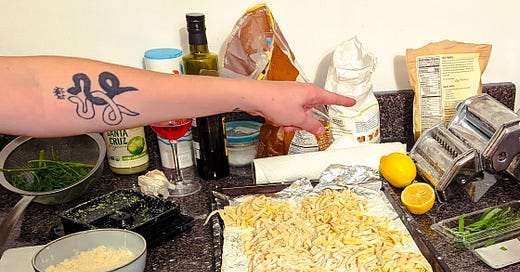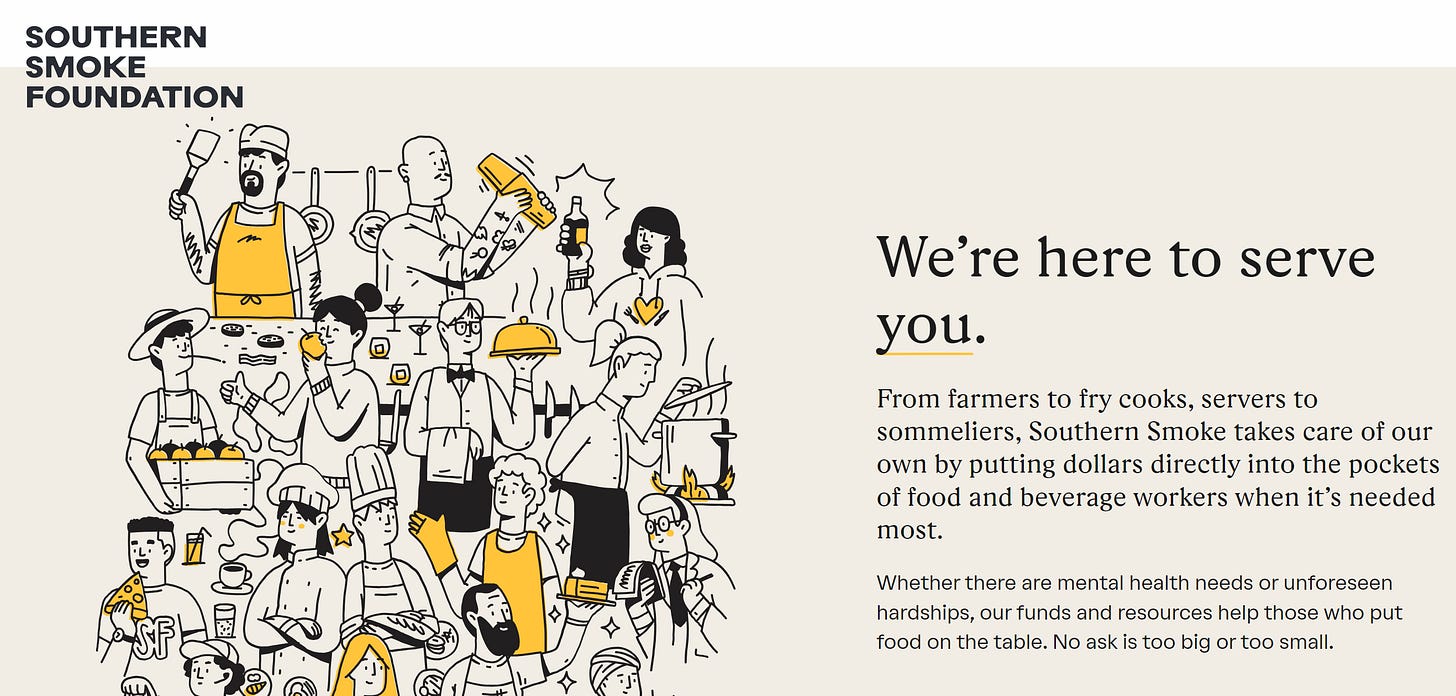Mental Healthcare on the Menu - No. 21
And how Southern Smoke is setting the standard for industry access to care.
Welcome to Vegarie! A newsletter full of stories and interviews with women in food. If you haven’t already, please subscribe (while it’s still free!) and you'll receive my biweekly newsletter on Tuesdays. Today, I’m sharing part two of a three-post series on the restaurant industry. We talk a lot in the kitchen. We talk about how to improve dishes, how to provide better service, how to source our produce more locally…but if there’s something we don’t discuss enough, it’s how to better our mental health. At the core of all meaningful work is a capable, healthy brain. But as an industry focused on providing services to others, we often forget ourselves in the equation, and discussing mental health is still taboo.
The key to a good chicken stock is boiling it calmly. Just high enough to release all the good juices, but not so high that you can’t walk away from it for at least six hours without it bubbling over. Occasionally, you'll need to skim the fat from the surface with a ladle, but this isn't a task that calls for attentiveness. Sometimes I think a pot of chicken stock is the perfect analogy for a cook's mental state working the line of a busy restaurant. The pot of emotions simmering so low beneath the surface--of the pile of bones and trimmings--that one would hardly notice the water is boiling at all. Turn up the heat a bit, maybe run out of our mise en place during a busy service, or drop your spatula behind the grill when you need to flip five chickens, and we'll bubble over.
For most, mental health is a topic better left off the menu. It's a topic discussed away from the dinner table altogether—in private, and never vertically up the chain of command. Expression of your depression or anxiety is passed cloyingly through dark humor, line-cook to line-cook, or not at all. If you're crying on the line in the middle of service, you're soft. Or more understanding chefs may say, you need to work on your composure. They’ll try to remind you that as a result of your tears, mixed with the sweat on your brow, that cooking is hard and you signed up for it. But at the end of the day, you’ve served hundreds of hungry people. They all went home happy. You did that, you made their day. So, who needs a therapist when you have 12 AM rounds of mezcal shots and a pep-talk from your sous-chef?
Roughly 15 million people reported working for the hospitality industry in the latest statistics collected by the United States Bureau of Labor. That’s a huge chunk of our population washing down emotional trauma with mezcal shots. The service industry as a whole comes with many unique pressures. Whether it be food safety concerns, customer service conflicts, low wages, or intense labor conditions, all factors contribute to a stressful working environment. Then there’s the partying that is engrained in the culture of a career in the hospitality industry, leading to higher rates of substance use disorder diagnoses than any other field—at nearly 17 percent. All things considered, it’s understandable that substance abuse, mental health challenges, and suicide are so prevalent in the industry.
What we fail to acknowledge is how much mental health outside of the kitchen impacts performance at work. “It’s why all chefs are drunks,” Bourdain says on camera at the beginning of RoadRunner, the documentary made about his life post-suicide in 2018, “Because the rest of the world doesn’t run like our kitchens.” In his quote, he’s complaining about a supplier’s tardiness and how much stress it brings him, but the joke, like so many of Bourdain’s quotes, carries a deeper message. For one, he’s acknowledging chefs as problematic—in one way or another—struggling with substance abuse or having a bad reputation. And two, that the rest of the world outside of the kitchen is out of our control.
After the coverage of Bourdain’s passing, and the forced pause for hospitality workers during the COVID-19 pandemic, there was a lot of buzz in the news about the lack of mental sustainability in the field. Several chefs shared their struggles with the world, including David Cheng who published his memoir, “Eat a Peach,” which the Times quoted as “a catalog of his anger-management problems alongside a history of mental-health issues, which include depression and bipolar disorder.” After said publication, several stories were released painting colorful images of just how bad Cheng’s rage in the kitchen was. Ms. Selinger’s account for Eater is one of the most detailed accounts ever written about the effects on restaurant workers, including quotes on which Cheng threatened the life of a line cook when his family meal didn't meet par. It's safe to say Cheng didn't tear apart his line cook because their family meal was bad. Evidence point much more clearly to his psychological issues, like so many restaurant workers’ with pre-existing conditions exacerbated by a high-stress atmosphere. While sharing stories like this are a good sign for change, bad habits die hard, and emotional blow-ups in the kitchen are still plenty.
That’s the hospitality industry, as anyone who has been a part of it for at least the last 20 years will tell you. "The concept of mental health in the kitchen is so new," Lisa Nakamura, a veteran chef and first woman to cook at the French Laundry, recently told me. "Most of my career I worked too much. It wasn’t until the pandemic that I realized the cracks forming, and thought—hey maybe I should work on my mental health.” This reckoning is a wonderful sign in itself. But while this tells us the industry is changing its approach to mental health, I have yet to work with a chef who suggests therapy as a solution. Which made me wonder, why not? What is it about the hospitality industry that has made discussions of mental health taboo? Why aren’t restaurant owners making more of an effort to supply their staff with sufficient and affordable healthcare? What if, below the surface, something more serious is boiling for a line cook, a server, or even the chef, that could use attention?
To fully answer these questions, we need to acknowledge the changes that have been made to improve conditions. Let’s start with accessibility. In 2014, amendments were made to the affordable care act to improve healthcare coverage for underpaid workers. The mandate indicates that employers in New York State with at least 50 full-time employees must offer health insurance to their employees, or pay a fee. Now, this is a great first step. However, it remains that there are no stipulations surrounding the cost to the employee. What percentage does a company cover? What is the quality of the plan, or the inclusion of mental healthcare in that plan? We don’t know. And it could, and does, differ depending on the choices made by your employer. Often, their coverage is offered to employees at a discounted rate due to the volume of care plans that the company could elect to cover, should the employee choose to participate. For most, the cost is still too high for consideration. In my current situation, for example, healthcare is offered as a $250+ deduction per month, which for front of house—servers, bussers, and bartenders, could be manageable as long as restaurants remain busy and tips meet the average 20%. As for back-of-house—cooks and dishwashers, this cost is around 10% of our monthly pay, making the decision more difficult. Additionally, this coverage doesn’t include extensive coverage for a mental health therapist, so if you wanted to see someone regularly, such services would come out of pocket.
Now, if this is all true, what resources do we have as under-paid workers? Well, after some digging, I found several free and low-cost services. Among these include support and substance abuse programs, like Ben’s Friends, NYC-Well, and several support programs through Southern Smoke Foundation. Above the pack, Southern Smoke stood out to me as an example of what should be considered “industry standard.” A Foundation formed by Chef Chris Shepard to raise funds for the MS society, Southern Smoke has since expanded to supply grants for struggling restaurants during and post-COVID, and in 2020, rolled out a mental health program, Behind You, which provides 6 months of free therapy for food and beverage workers in California, Illinois, Louisiana, New York, and Texas. Those who live outside of the service states can apply for financial assistance for mental health crises through their Emergency Relief Fund. Ironically enough, regarding my reference to Cheng as an icon of the problematic chef—he was a major contributor to Southern Smoke when he won the game show Who Wants to Be A Millionaire in 2020, donating his bounty in earnest. Blown away by the steps this group has been taking, I was surprised that this resource was news to me three years after its creation.
I wanted to know why. Why do we have such great resources available to us, but still aren’t using them? Why don’t our employers share this information with the team, and why is discussing mental health still taboo? “I think what we’re seeing post-COVID, and post-Bourdain is a general increase in awareness,” Catarina Bill, director of philanthropy at Southern Smoke, tells me. “It feels like more employers are aware of the disparities in mental healthcare and want to provide for their workers. But most aren’t aware of the options, or are still struggling with small budgets to meet expectations.” As for the employees, “it’s cyclical,” she suggests, “hospitality workers are all back and working harder than ever. They are even more aware of their circumstances and a lot of people are frustrated that change hasn’t come full circle.” Behind You is one of Southern Smoke’s many efforts to remedy the gap, connecting University Graduate and Medical students with referrals to free counseling through University treatment centers. “It turned out to be a win-win match, most hospitality workers don’t have time to hop on a bus or two and trek across town just to see a therapist. Telehealth has made the program even more approachable for this group.” Catarina and the rest of the Southern Smoke crew are hoping that through connection to more University programs around the country, awareness of this resource will continue to grow.
This is a call for more no-cost mental healthcare programs for hospitality workers and more awareness in the industry about our options. Because, unlike our chicken stock, our emotional baggage isn’t going away from a little skimming around the surface with a ladle. And I don’t know about you, but I don’t want to fight another cook over an over-done prawn or sub-par family meal.






Great piece! I hadn't heard about these resources either, but I will keep them in mind.